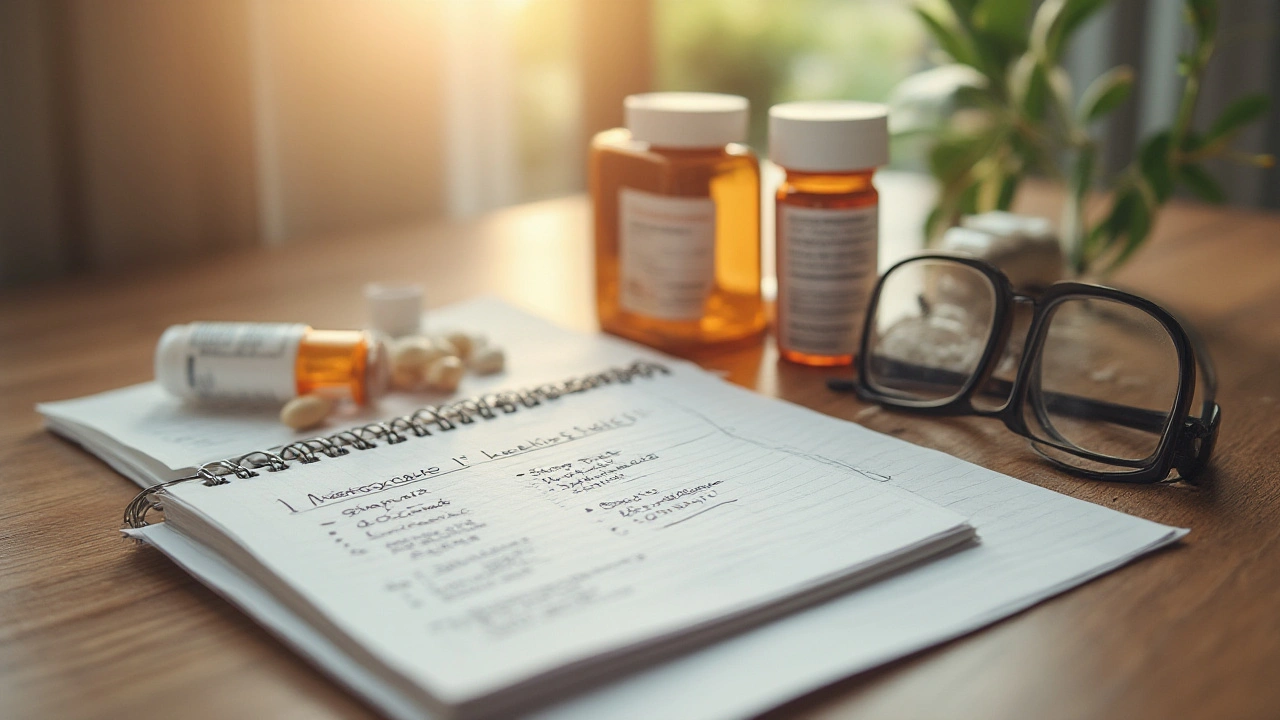Hot flashes don’t warn you—they just crash in. One minute you’re fine, the next, you’re wrestling with sweat patches and a heart that refuses to settle down. Menopause pulls you into a wild ride, and far too often, good info about medical help gets buried under tips about herbal teas and yoga breathing. Let’s be real: for some women, over-the-counter tricks barely scratch the surface. Pharmaceuticals step in when night sweats keep you up, irritability won’t budge, and intimacy feels almost impossible. But what does the science really say? What options are out there, and what can you actually expect if you go down the medical route?
The Science Behind Menopause and Why Symptoms Happen
Once you understand what’s changing internally, it gets clearer why pharmaceuticals are sometimes needed. Menopause isn’t a random event. At its simplest, it’s the end game for the ovaries—they slow production of two handy hormones: estrogen and progesterone. For most women, this hormonal tidal wave comes somewhere around age 51, though for some it shows up much earlier or much later. The dip in hormones kicks off an astonishing range of changes: hot flashes for about 75% of women, night sweats, unexplained fatigue, anxiety, vaginal dryness, and bone density loss.
Research published in The Lancet in 2018 found that about half of women get hit hard enough by symptoms to need actual treatment—not just lifestyle tweaks. There’s a biological reason for that. Estrogen and progesterone aren’t only about fertility. They play anchor for brain chemistry, bone resilience, skin softness, and even heart protection. Once those hormone levels plummet, it’s open season for discomfort and risks you never dealt with before.
A common misconception is that menopause is over quickly. In reality, many women ride this rollercoaster for about four to eight years. Pre-menopause, perimenopause, post-menopause—each stage comes with a new batch of symptoms. For example, migraines might disappear for some, but heart palpitations or urinary tract issues set in.
What stands out? There’s no one-size-fits-all. Some women walk through menopause like it’s a breeze. Others feel like strangers in their own bodies. But when symptoms get in the way of daily life, science-backed pharmaceutical options come into the conversation—even for women who’ve tried everything else.
Hormone Replacement Therapy: Fact vs. Fear
Mention hormone replacement therapy (HRT) at a dinner party and the myths start flying. Some swear by it; others look terrified. But what’s really in the mix? HRT usually means supplementing lost estrogen, sometimes combined with progesterone—especially important if you’ve still got your womb, since unopposed estrogen can raise the risk of certain cancers.
The main promise: reducing hot flashes, night sweats, mood swings, and even protecting against osteoporosis. A 2023 meta-analysis in JAMA found that HRT slashes hot flashes by more than half for most users and increases bone density enough to turn the tide on early fractures. Mood improves in up to 70% of women starting HRT, and sleep usually stabilizes after about a month of consistent use.
But the safety debate is where things get complicated. Back in 2002, researchers stopped a big U.S. study (the Women’s Health Initiative) early because of a reported rise in risks for breast cancer, clots, and stroke with combination HRT. Panic spread like wildfire. Doctors stopped prescribing HRT overnight. But deeper reviews with longer-term tracking showed that the risks are far more nuanced, especially for women under age 60 or within 10 years of their last period. The risks for breast cancer are very slight for these groups, and data shows cardiovascular protection, not harm, when treatment is started early. Newer HRT products use lower doses or different forms, with even fewer side effects.
Hormone therapy isn’t just one pill. You’ve got: patches, gels, tablets, sprays, and implants. Dosage and choice come down to your specific symptoms and medical history. Some options deliver hormones steadily to avoid rollercoasters. Others provide quick, sharp doses for urgent symptoms.
Menopause hormone therapy works best when it’s tailored. You and your doctor play detective—tracking symptoms against lab results, lifestyle, and medication risks. For some, a low-dose patch is enough. For women with surgical menopause (ovaries removed early), stronger therapy may be warranted.
But let’s get blunt: no medicine is completely risk-free. Blood clots and breast tenderness are rare but possible. Vaginal bleeding or headaches might mean you need to switch products. But the idea that HRT always leads to cancer? That’s simply not true—especially for short-term, low-dose users, according to the British Menopause Society. For many, the payoff far outweighs the risks.
| Symptom Relief Rate (HRT) | Major Risk (under age 60) | Bone Density Benefit |
|---|---|---|
| Approx. 70-80% | 0.1-0.3% higher risk | 30% fracture reduction |

Non-Hormonal Medications: Useful and Underappreciated
If hormones aren’t right for you—because of past cancers, blood clots, or just personal choice—what else is on offer? Loads, actually. Plenty of women manage just fine with non-hormonal pharmaceuticals, though these get talked about way less.
Certain antidepressants, like venlafaxine and paroxetine, actually knock down hot flashes. They aren’t giving you more estrogen—they’re turning down the brain’s thermostat a notch. A study at King’s College London in 2022 showed these meds cut hot flashes by 40-60% in menopausal women who can’t or won’t use hormones. The doses are lower than what’s used for depression, minimizing side effects. Some doctors will try gabapentin for night sweats or restless sleep—especially in women who can’t tolerate other meds.
Then there’s clonidine (a blood pressure med), which brings hot flashes under control for some. The results are less dramatic than HRT, but for those with restrictions, every degree of comfort counts. Ospemifene, a newer non-hormonal medication, is geared toward vaginal dryness and painful sex. It works a bit like estrogen, but only targets vaginal tissue, never reaching other body parts—making it safer for breast cancer survivors. Give it a few weeks, though: these meds aren’t instant miracle workers.
Genitourinary syndrome—fancy term for dryness and discomfort—can be sorted by local estrogen creams or even hormone-free lubricants. Pharmacy shelves in the UK are better stocked than ever before, with regulated low-dose options behind the counter and advice on the spot, no need for a full doctor’s appointment for many products.
One thing you might not know: The NHS in 2024 expanded prescribing rules for pharmacies, letting more women try certain low-risk menopause meds without waiting months for a GP issue. That’s been game-changing for folks in busy cities like Bristol, where waiting lists can feel endless.
Still stuck? UK menopause clinics are popping up on the NHS and privately, with physicians ready to talk seriously about even the most severe cases. Pain during sex, bladder problems, sleep gone missing—these aren’t just background noise. Today there are medical answers, not just sympathy, available on prescription.
Side Effects, Stigma, and Sorting Fact from Fiction
Here’s the sticky bit: start talking about menopause meds, and suddenly everyone’s got a horror story, or else whispers like you’re talking about the dark arts. The reality is way more measured.
Standard HRT might come with breast tenderness, bloating, irregular bleeding, or even mild headaches. For most, these fade after a few months—switching to transdermal (patch or gel) forms can often clear up stubborn side effects. Rare but urgent issues? If your leg suddenly swells or you’re short of breath, you should ring emergency services—risk of clot, though incredibly small, isn’t zero.
Non-hormonal meds aren’t completely innocent, either. Gabapentin can make you drowsy. Antidepressants can trigger nausea early on, but this tends to pass. Clonidine sometimes causes dry mouth or fatigue. Still, most women who stick with prescription advice—and start low, go slow—find benefits quickly outweigh downsides.
Much of the misinformation comes from outdated studies or quick-take headlines. UK safety standards for menopause meds rank among Europe’s strictest thanks to the Medicines and Healthcare products Regulatory Agency (MHRA). Every med is reviewed annually, with actual patient feedback factored in. Doctors are trained to flag early warning signs and shift treatment if anything odd happens.
But the real barrier isn’t always medical—it’s mental. Stigma stops women from speaking up. A 2024 survey by the British Menopause Society found that 67% of women held back from asking about pharmaceuticals because of shame or fear of being seen as “weak.” The truth? There’s no badge of honour for suffering through menopause untreated anymore. Today’s treatments are designed with safety, dignity, and actual science backing every option. Women deserve proper relief—and open conversations free of embarrassment make a real difference.

What Should You Expect? Navigating Treatment Decisions and Future Trends
Starting any menopause medication is a mix of detective work and trial-and-error. Your GP or menopause specialist will typically start by reviewing your medical history (especially breast cancer or clotting risks), then suggest bloodwork. Depending on your needs, you might trial a few products to see which brings the best relief with the least fuss.
The NHS menopause pathway usually starts conservatively—lowest possible dose, shortest required time. Reviews happen every 3-6 months at first to check for side effects or improvements. Digital health apps are now helping women log symptoms in real time, giving doctors better info to tweak or swap meds as needed. Remote consults are also standard in 2025, so you don’t always need to drag yourself to a cold waiting room.
Cost matters: NHS covers nearly all first-line meds, but private clinics and online pharmacies sometimes charge steeply for newer, boutique brands. Compare prices, and don’t assume higher cost means better efficacy. Generics work just fine for most cases.
Looking ahead, pharmaceutical innovation is exploding. Selective estrogen receptor modulators (SERMs) are getting smarter, targeting relief more precisely. Targeted sprays and rapid-release tablets are letting more women pick what fits their lives, not just their prescriptions. Awareness campaigns are making it more acceptable—not just possible—to ask for help and get it, stat.
And it’s not all meds. Pharma industry partnerships with wellness brands mean options are integrating—from regulated herbal extracts to medical-grade lubricants and period-tracking apps. It’s a new age where menopause care is becoming as tailored and tech-driven as any other phase of womanhood.
The main thing is: you choose what works for your body, your stage, your priorities. Pharmaceutical help isn’t admitting defeat. It’s smart, and it’s available—in Bristol, Birmingham, or wherever you are right now. Menopause can’t be paused, but misery isn’t inevitable. Your choices today are built on years of science, honesty (finally), and more options than ever before.


Amber Swartz
July 17, 2025 AT 22:47Wow, I must say reading honest takes on menopause medications is a rarity, so kudos for that!
But honestly, it's tricky when you consider how much one has to weigh the benefits against those pesky side effects. Some women flaunt HRT like a miracle cure, while others swear they felt worse, with mood swings and all.
For anyone thinking of going down the pharmaceutical route, I urge caution—don't just take the hype at face value. Make sure to ask about all possible side effects upfront because not all meds play nice with every body.
And can we talk about how little attention is sometimes given to alternative treatments? It's like the only way is hormonal pills or patches!
Anyway, I wonder if anyone here has personal stories to share? How did you balance the risks and benefits in your journey?
Frank Piccolo
July 19, 2025 AT 20:40Honestly, I think people make this way more complicated than it needs to be. Look, menopause is natural and pharmaceutical companies just cash in on women's discomfort.
HRT is pushed like some holy grail, but have you looked at the statistics on complications? It's lazy to just jump on the bandwagon without questioning the motives behind these medications.
Also, relying on medications for what is essentially a phase in a woman's life is, to me, short-sighted. Why not support natural ways instead?
I probably sound harsh, but I just find all this commercializing of health quite distasteful.
Anyway, that's just my two cents from a critical perspective.
michael T
July 21, 2025 AT 21:20Man, this topic just burns me up every time. The way meds for menopause toss all kinds of chemicals into your system, tweaking your hormones—it's like signing your body over to a corporate god.
We talk about side effects like they're just collateral damage, but what about the emotional toll? Some of these drugs make women feel like strangers in their own skin.
I almost feel intrusive saying this, but for those who had bad reactions, how did you cope? Did the doctors really listen?
And don't get me started on the price tag—it's a racket!
Still, it’s good to have this guide laying out facts straight. Bright side, folks.
Christina Kooiman
July 23, 2025 AT 19:13It is imperative that discussions about menopause medications maintain grammatical clarity, so I appreciate this article's effort in clarity.
However, I find that often the nuances of side effects are glossed over. Women need to be informed not just that side effects exist but what they entail with precision.
For instance, when discussing HRT, the increased risk of cardiovascular issues should be incontrovertibly clear.
I urge those studying these treatment options to reflect on the presented data critically and demand thorough explanations from healthcare providers.
It's not just about taking meds; it's about understanding their full impact on one's body and life.
Barbara & Greg
July 25, 2025 AT 17:07From an ethical perspective, this article serves as a vital discourse on the responsibilities of medical professionals when presenting menopause treatment options.
The benefits of medications must not overshadow their potential to impose undue burden on patients, both physically and psychologically.
It is a moral imperative that women are empowered with comprehensive knowledge, so they can make informed decisions aligned with their values.
The commercialization of HRT risks commodifying natural life stages, which is a profound concern.
In light of this, I hope that a more holistic and humane approach to menopause treatment gains traction in the medical community.
selma souza
July 27, 2025 AT 15:00I must say, I appreciate the straightforward presentation of side effects in this article, which is often overlooked in discussions around menopause treatments.
Many sources sugarcoat the risks, leaving women ill-prepared for what may lie ahead.
The lack of emoticons in communication here actually lends to a serious tone, which is appropriate for such a topic.
However, I do wish there was more focus on patient experiences and varied responses to treatments, as side effects can vary widely.
In conclusion, I strongly advise anyone considering HRT or other pharmaceuticals to consult multiple medical opinions and not take things lightly.
James Boggs
July 29, 2025 AT 12:53This guide is a commendable resource that concisely encapsulates complex information about menopause medications.
Given the sensitive nature of menopause and the diversity of individual experiences, having a clear view of treatment options, benefits, and possible side effects is invaluable.
While medications like HRT have demonstrable benefits, their risks must be transparently communicated.
It's reassuring to see a resource that respects patient autonomy and encourages informed choices backed by rigorous evidence.
I would encourage multidisciplinary collaboration for supporting women through menopause, integrating both medical and lifestyle approaches.
Addison Smart
July 31, 2025 AT 10:47This discussion makes me think deeply about the cultural dimensions of menopause treatment across different communities.
While pharmacological interventions like HRT are prominent in Western medicine, many cultures embrace alternative or holistic practices that honor the transition without pharmacological reliance.
The challenge remains in balancing respect for cultural values with evidence-based healthcare.
Moreover, the varied symptoms and individual bodily responses mean that a one-size-fits-all approach to medication is misguided.
It's important we maintain an open dialogue, sharing insights and respecting boundaries, so women can navigate menopause with dignity.
David Smith
August 2, 2025 AT 08:40Ah, menopause meds—another saga of medical folklore meets real life drama.
So many women have been promised relief and ended up battling side effects that feel more like curses.
I mean, it's not just about hot flashes; it's the emotional roller coaster, the anxiety, the body changes that meds sometimes amplify.
Sometimes I wonder if there's enough compassion in the system or if it's just about ticking off treatment boxes.
Stories from real women often get lost in clinical jargon, and that's a tragedy, in my opinion.
Lissa Veldhuis
August 4, 2025 AT 06:33I find that many so-called guides on menopause treatments tend to gloss over the emotional and psychological complexities women face.
This article’s candid approach is refreshing, yet it is crucial to emphasize that these drugs are not a catch-all solution.
There’s an undercurrent of judgment that persists—women are expected to endure or medicate without full acknowledgment of the societal expectations placed upon them.
Plus, let's not forget how individual the experience of menopause is; what works for one might debilitate another.
It's necessary to foster informed conversations where women feel validated in their choices around treatment or non-treatment.